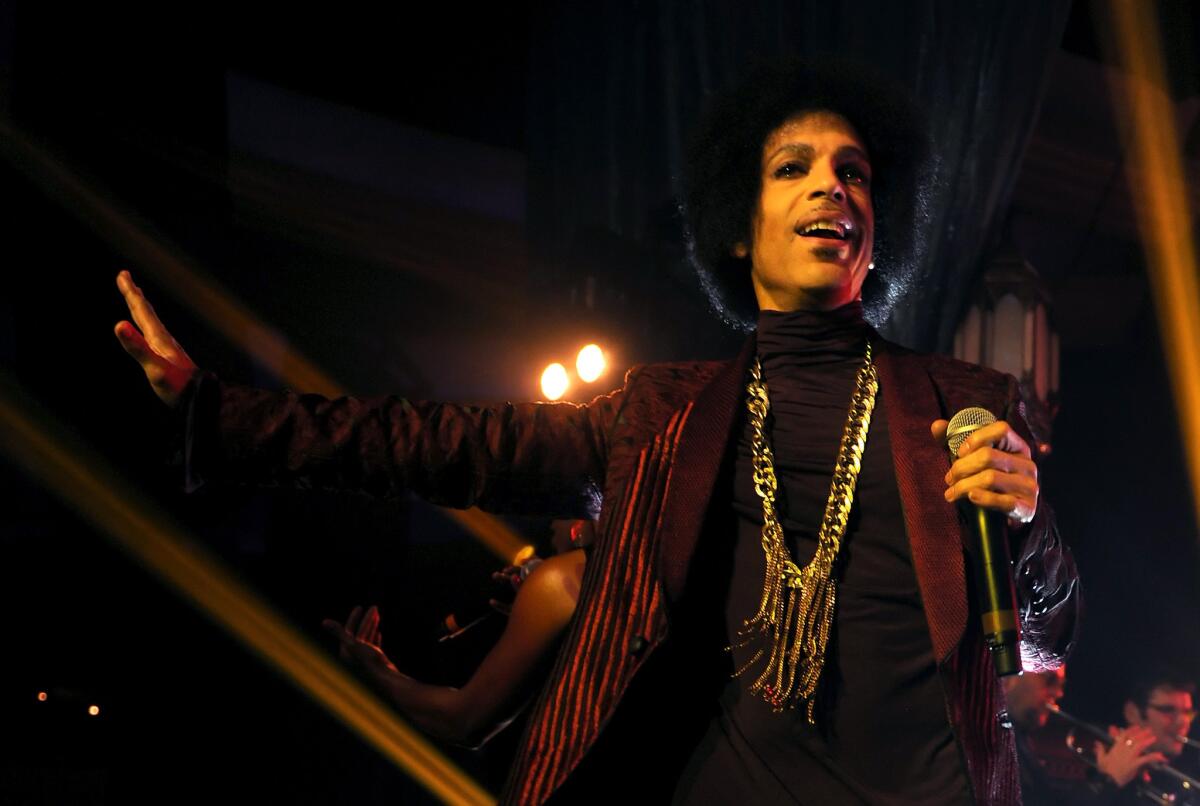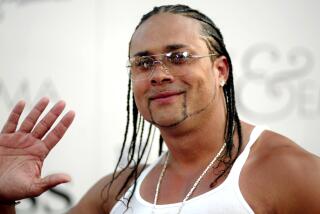Prince’s secret weapon: a versatility that united pop genres under one roof

- Share via
Pick a sub-genre and Prince was not only fluent in it, but at his best could surpass that style’s top creators.
The artist, who died at his home in the Minneapolis area at age 57, was among the most versatile and restlessly experimental pop artists of our time. A crafter of melodies and lyrics whose early work connected disco and synthetic funk and whose fruitful mid-period merged rock, soul, R&B and synth-pop, Prince’s muse as it matured contained multitudes.
Whether the hardened protest soul of “Sign o’ the Times,” the catchy new wave of “When U Were Mine,” the psychedelic pop of “Raspberry Beret” or the bawdy bathroom ballad “Darling Nikki,” Prince explored the breadth of American music, in the process uniting generations and connecting disparate fans who otherwise didn’t agree on much.
During the decades in which he made music, Prince lorded over a pop landscape that was increasingly fractured, and he alone seemed to understand how to unite it all under the same house-quake roof.
Balladry? Nothing compares to “Nothing Compares 2 U,” his heartbreaking song about a lost love that Sinéad O’Connor turned into a hit. Prince’s version is more minimal than hers, but the impact of its kicker line — “All the flowers that you planted, sugar, in the backyard/All died when you went away” — is as devastating as they come. Not only a human heart but nature itself has been destroyed by a lover’s departure.
In his ballads and mid-tempo love songs, Prince’s precisely metered lines expressed the variety of human emotion: “How can you just leave me standing alone in a world that’s so cold?” “I guess I should have known by the way you parked your car sideways that it wouldn’t last.” “Ain’t no particular sign I’m more compatible with I just want your extra time and your kiss.”
At his best, he managed in simple but poetic language to express the unexpressable, as in “Take Me With U.”
“I don’t care where we go
I don’t care what we do
I don’t care pretty baby
Just take me with you”
When Prince wanted to rock, he’d step center stage and make a valid musical argument that he was the second coming of Jimi Hendrix. His solo during “Let’s Go Crazy” is fluid, ridiculously inventive and melodic at the same time. I’m not the only one who can trace from memory every note of it; it’s one of the most eloquent guitar solos ever recorded. He dabbled in Beatles-esque pop on “Around the World in a Day” managing to hit with the funk-psychedelia of “Raspberry Beret” when dance pop was on the ascent.
“Overcast days never bothered me none,” he sang, a snippet of a verse that in 10 syllables expressed the exuberance of a new crush.
On “Baby I’m a Star,” he seamlessly merged funk, soul and rock while demanding our undivided attention: “Hey, look me over/ Tell me do you like what you see?” Almost always, the answer was yes.
More than anyone, though, Prince helped define funk music after Funkadelic, James Brown and Sly & the Family Stone laid the groundwork. Harnessing new-generation synthesizer sounds in service of the groove, he laid the foundation for a new movement. Whether in the raucous “Housequake,” “Mountains” or “Little Red Corvette,” Prince understood the lethal power of melody, propulsion and rhythm.
Those classic songs from the 1970s and ‘80s are the ones that made Prince a household name, but he never stopped evolving, never quit honoring his singular muse. So grand are his accomplishments that the records that few but the die-hards heard — those that he recorded after his very public falling out with Warner Bros. Records in the 1990s (they later reconciled) — already seem like buried treasures waiting for our discovery.
For tips on playlists, Los Angeles music news and video clips, follow @liledit
More to Read
The biggest entertainment stories
Get our big stories about Hollywood, film, television, music, arts, culture and more right in your inbox as soon as they publish.
You may occasionally receive promotional content from the Los Angeles Times.








